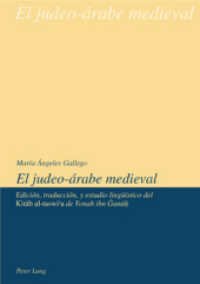Full Description
This handbook provides a comprehensive study of social work and migration internationally. It offers an original, intellectually strong and professionally coherent account of how social work with migration is shaped and practiced internationally, exploring ongoing and new debates and key areas such as conceptual foundations, migration policies, methods and innovations in practice, research and educational methodologies as well as lived experiences, opportunities and challenges for migrants and social workers.
The book is divided into four parts:
• More Than One Theory for Social Work and Migration: A Critical Overview
• Working with Migrants: Social Work Practice and Experiences
• Teaching and Learning About Migration: The Role of Social Work Education
• Social Work Research and Migration: Ethics and Methodological Challenges
The book also comprises 30 newly written chapters and brings together established and up-and-coming academics from different regions.
It will be required reading for all scholars, students and social work practitioners.
Contents
1.Introduction. Part I - More Than One Theory for Social Work and Migration: A Critical Overview. 2.(Anti-)oppressive practice with migration - A conceptual analysis for social work. 3.Critical Social Work Ethics and Intersectionality: Considerations for Working with People from Refugee Backgrounds. 4.From deportability to grievability: A theoretical perspective on the intersections of social work and migration. 5.Social work discourses around the concept of 'culture'. 6.Beyond 'commonsense': Theorising social work and migration. 7.The transition towards superdiversity challenges social work. Part II - Working with Migrants: Social Work Practice and Experiences. 8.Bridging borders: The transformation of border and asylum policies and the impact on social work practice. 9.Rites of passage: Emotional and geographic journeys of refugees from their home in Africa to Northern Italy. 10."We are all together" Social work and internal displacement within complex emergencies: Practitioners' perspectives on practice in Northwest Syria. 11.Unaccompanied minors on the move: Trauma-informed approaches and the healing power of storytelling in social work practices. 12.Unaccompanied minors in Mexico: Between support and institutional violence. Perspectives from social work practice. 13.Transnational social work on the brink of practice and politics: Supporting family reunification of refugee families. 14.Social work practice with forced migrants: Trauma-informed resilience perspective. 15.The promise and challenges of anti-oppressive social work with young people from refugee backgrounds. 16.Rights-based social work with unaccompanied children and young people: Tensions and opportunities. 17.Women with a migrant background facing intimate partner violence (IPV): Implications for social work from an intersectional perspective. 18.Integration challenges for highly educated women migrants: Impacts on professional identity and social work. 19.Critical and radical voices from the frontline: Advocacy and collective action in social work on migration amidst crises in Greece. Part III - Teaching and Learning About Migration: The Role of Social Work Education. 20.(De-) colonial perspectives on migration in social work education. 21.Educating social workers for anti-racist practice with Unaccompanied Asylum-Seeking Children (UASC). 22.Homesick for mobility: A pedagogical invitation for critical social work to relationally engage indigenous and migrant justice. 23.On maps, lanterns, food and compasses: Human rights and migration in social work education. 24.The transformative power of an integration journey in social work education: A case study on cooperation with an expert by experience with migration background. Part IV - Social Work Research and Migration: Ethics and Methodological Challenges. 25.Decolonial perspectives for epistemic justice: challenges for social work research. 26.Are procedural ethics enough?: Pursuing ethical social work research with refugee and forced migrant populations. 27.Navigating ethical complexities in research with people of refugee background: Care, time, and reflexivity as key considerations. 28.Art-based research with unaccompanied migrant children. 29.Ethnography of migrations from social work: Approaches from Mexico. 30.Epilogue.
Sofia Dedotsi, Elena Cabiati and Emilio José Gómez-Ciriano








